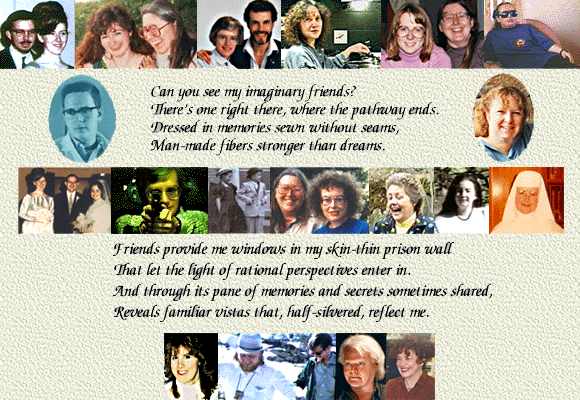Dennis Majerski
I was 5 years old when we moved to the new brick house on Clyde
Avenue in Chicago. This was back
when 8800 South was still considered almost country. There were
few houses on the
surrounding blocks and, with a four block park directly across
the street, it seemed that
you could see forever. One of the few other houses was next door
to ours and in it lived
one of the most beautiful creatures I had ever had the luck to
encounter in my admittedly
short life. His name was Dennis.
He had blond hair and perfect features. He was also 3 1/2 years old.
From the moment I first saw him, I was in love.
Somehow I got hold of
his picture in a carved, fake ivory frame and tucked it
faithfully beneath my pillow
each night as I went to sleep. The depths of my obsession with
this perfect little boy
should be clear when I tell you that I would sit beneath his
window and
listen to him practicing his accordian, surely an act that should
be classed with the
highest devotation.
Dennis' mother was Rene and his father, Sam. Sam worked in the
steel mills and Rene
was a stay-at-home mother, a perfectly respectable profession in
1952. My mother was
divorced, which was not as common in those days, and so I was
taken care of after school by
my grandmother. Rene called herself my second mother and, on
warm summer evenings when we
would play in front of our houses (when the mosquito trucks
weren't coming around), I would
hide my head in her lap for our games of hide and seek. Inside
Dennis' bedroom was a thing
of wonder -- a blackboard on which Rene would draw cartoon
characters so perfectly that
it was a wonder she didn't do it professionally. Perhaps, in
today's world, she would have.
Sam was a big man, strong but gentle. I can still picture them
all, Sam and Rene and Dennis,
dressed for church on Sunday and getting into their white and
blue Chevrolet. I think,
even today, they are the image that pops up in my mind when
people talk about the "ideal family".
Even in ideal families, children can be a handful, especially
when one of the ringleaders has
a taste for mischief and no fear of repercussions. I was
spoiled. There's no other way to
say it. I was adored and pampered and made to feel that the
world revolved around me. And
I was trouble on two feet. The land on the other side of our
house was finally sold to the
Smiths, a very nice older couple that I adopted as second
grandparents -- a child can never have
too many adoring adults around -- especially ones that know how
to bake. This was the
first time I got to watch a brick house actually being
constructed. It was a playland from
heaven. There were brick rows in various stages of construction,
and basements filled with
circular alumnium disks that came out of electrical boxes, and
there was "the hill".
The hill was a huge dirt pile that resulted from the initial
excavation of the house. While
the building, itself, was still only a hole in the ground and a
diagram on paper, that dirt pile
was the Rocky mountains and the Swiss Alps and Plymouth Rock
(which I knew must be
impressive), all rolled into one. Remember, this was Chicago.
And the hill was right next door.
In hot weather, grandfather and Sam would put out bathing pools
for each of us that were
heated by the sun. On one such day, Dennis and I were splashing
away with enthusiastic
abandon when I got an idea. Wouldn't it be fun to go all the way
up to the top of the hill
in our bathing suits and then come rolling down? Dennis wasn't
easy to convince that this
sounded like a better thing to do than just seeing how large a
splash you could get by
throwing a beach ball into the middle of the water. But I had
learned from grandmother than
a thing isn't worth having if it doesn't take some effort. I
kept after him and, finally,
he agreed that it might be fun. We clambered to the top and,
soaking wet, rolled down through
sand and dirt until we landed at the bottom, laughing
uproariously and looking like
something out of a Flash Gordon movie. Rene and grandmother
didn't find our resultant state quite so amusing.
My punishment, as usual, was to be taken in, washed off, and
sternly scolded not to
try that particular stunt again. Clean and dry, I ran back
outside in time to
hear from inside the Majerski house the sound of Dennis being
spanked. It's a sound that
still echoes down the years. Mother didn't believe in spankings
and I think it's because
she found something far more effective -- the punishment that one
metes out to oneself
when forced to confront the pain that one causes.
Dennis and I grew up and apart, as the eighteen months between
our ages pre-ordained. I married and
brought back my husband to the house where grandmother still
lived. I saw Dennis
there and he told me that he was getting married as well. He had
a picture of her and
she was as beautiful as he was, standing there beside her in his
Coast Guard uniform.
He said that he'd told her about me. I'm glad. Love is a very
precious memory and
should be cherished, even when you're five years old and he only
three and a half.
































![]() Copyright © 1996, Mary S. Van Deusen
Copyright © 1996, Mary S. Van Deusen